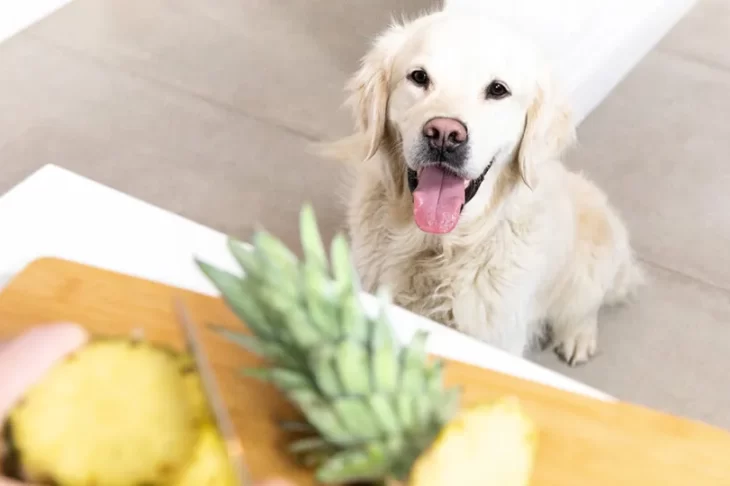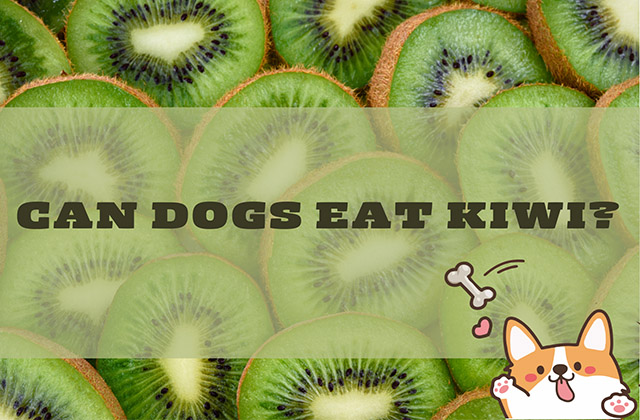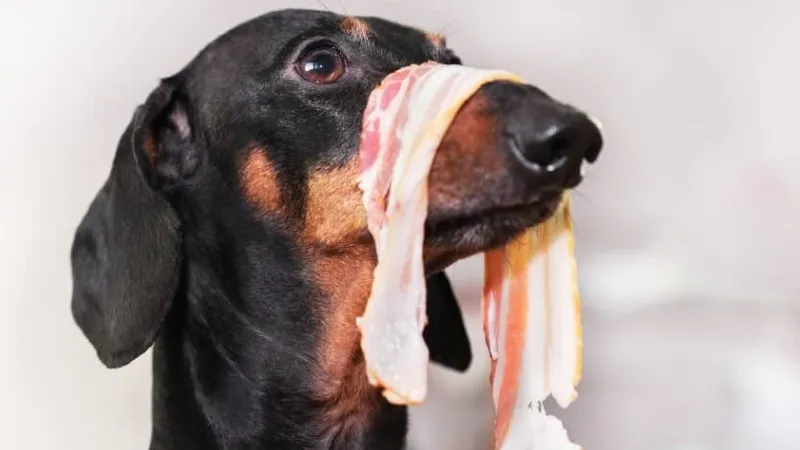
Can Dogs Eat Bacon? Is It Safe?
Yes, dogs can eat bacon, but it’s not recommended.
There is no denying that bacon is a tasty and alluring treat for a meat-eating animal. However, bacon is also processed, salty, and fatty, making it bad for dogs all around.
It’s not a big deal if your dog eats a little bit of bacon; bacon isn’t particularly toxic. But bacon does come with health risks. As too much of it can put dogs at risk for obesity and pancreatitis, we advise you to only feed it to dogs on extremely rare occasions and in the tiniest amounts.
Keep reading.
Table of Contents
Can Dogs Eat Bacon?
The general consensus is that no, your dog shouldn’t eat bacon. Given that feeding bacon to dogs has some risks and is generally a bad idea, this is the most straightforward and secure response. Plus, some individual dogs shouldn’t eat bacon at all due to allergies or other health conditions.
However, the majority of healthy dogs can consume a small amount of bacon without any issues. It makes sense that most dogs will be sniffing the air and giving you their cutest puppy eyes whenever you’re preparing a fry-up, given how delicious bacon is.
Bacon can be a very expensive treat because most dogs go absolutely crazy for it. It has a wonderful texture, is flavorful, and has a wonderful aroma. (It must smell absolutely divine to our canine friends, whose sense of smell is between 10,000 and 100,000 times better than ours.)
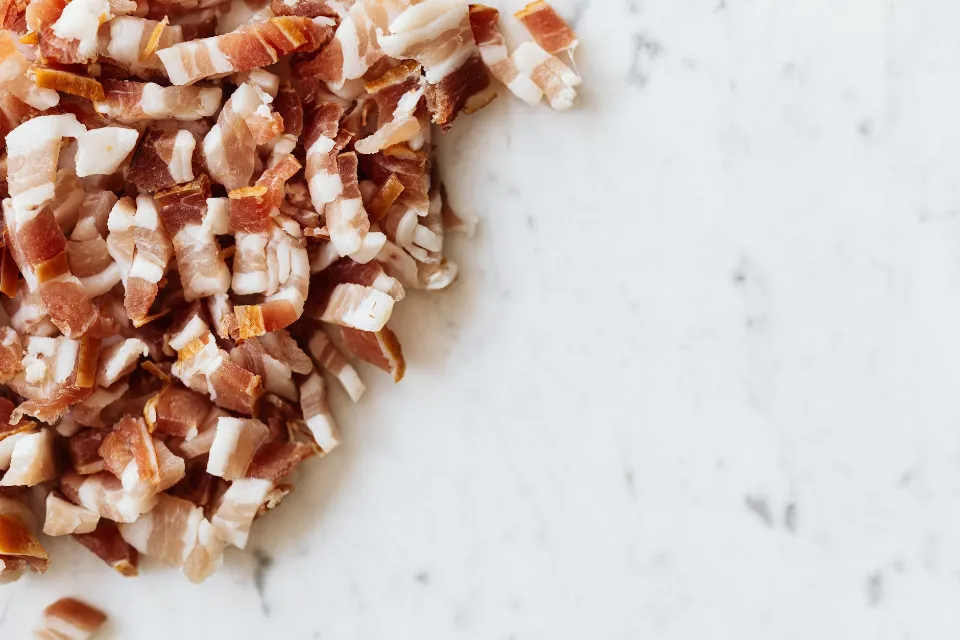
Discover Delicious Food Your Dog Deserves
But there are a few reasons why your pup shouldn’t eat bacon except for a small piece as a rare treat.
Bacon is “safe” for dogs to eat and it is generally fine to let your pooch have a small slither of bacon, just don’t offer them a whole rasher and don’t feed them bacon often.
Arguably, we humans shouldn’t eat bacon too often either for the same reasons, since bacon is high in salt and fat. Adding even more oil and fat when we fry it makes the meaty treat even tastier. Salt and fat aren’t good for dogs, and they are more sensitive to these components than we humans are. On top of that, overindulging in bacon may cause your dog to gain weight.
However, some dogs should never consume bacon. For example, a pooch with pancreatitis should avoid eating bacon because the high-fat content could trigger a flare-up of their condition.
Can Dogs Eat Bacon Raw?
No, your dog shouldn’t consume raw bacon. Although raw bacon is technically “safe” for a dog to eat, it is more likely to make them sick. Additionally, there is a slight possibility that the meat may have parasites or bacteria that could make your dog ill, just like with any other raw pork product. However, if your dog manages to eat a tiny scrap from the floor, they’ll probably be fine.
Can Dogs Eat Bacon Fat?
Technically, they could, but they probably shouldn’t. Again, a tiny bit on occasion is probably perfectly fine for most healthy, adult dogs. However, this rich fat can cause gastrointestinal upset, especially if your dog has a sensitive stomach. Bacon fat should not be given to dogs with certain underlying conditions, such as those who are on calorie-restricted diets or who have pancreatitis.
Can Dogs Eat Bacon Grease?
Don’t give your dog bacon grease, please. Once more, it is very greasy, high in fat, and heavy on the stomach. Bacon grease will probably upset your dog’s stomach and lead to gastrointestinal problems. Avoid spooning any grease onto your dog’s dinner if they have an underlying medical condition that is impacted by their diet or fat intake.
Can Dogs Eat Pork?
Yes, dogs can eat pork as long as it is cooked, served plain, and consumed in moderation. There are better protein sources out there, like chicken and fish, which are more digestible and healthier for your pup to eat regularly. Unless your dog has a pork allergy, that is. In that case, they must abstain from consuming any pork or pork-related foods, such as ham, bacon, and sausages.
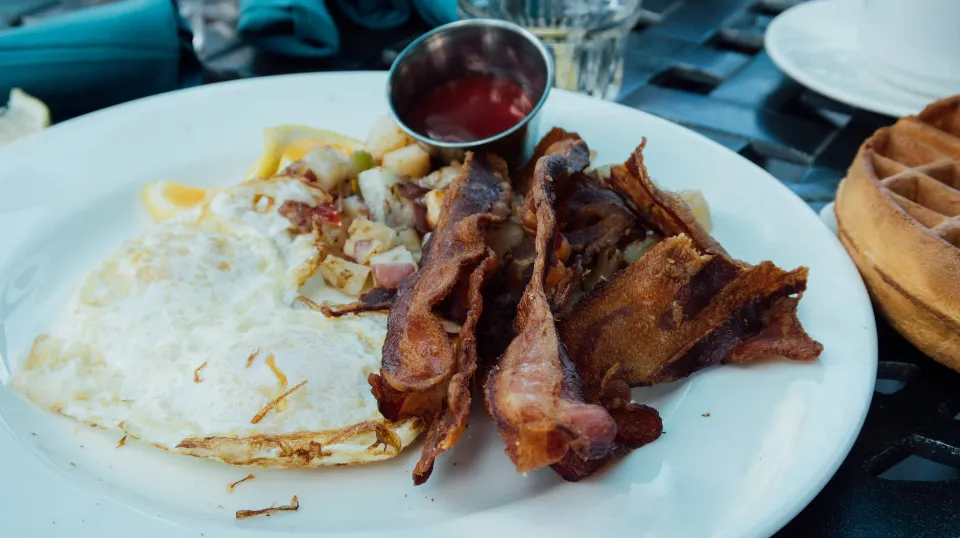
The Health Risks of Bacon
In terms of fat and grease, bacon is very high. As such, giving bacon to your dog — especially in large quantities — can lead to an upset stomach. Bacon grease can also clog your pup’s arteries.
When your dog is clamoring for a taste of bacon, it can be challenging to refuse them. However, despite the fact that your dog is making those sad eyes and turning up the cuteness level, restrain yourself. Regularly feeding bacon to your dog can result in inflammation.
In order for your dog to regularly absorb and digest food, for instance, the pancreas is in charge of releasing digestive enzymes in the stomach. Your dog’s ability to absorb nutrients from food and digest it is hampered when it is inflamed. If the pancreas isn’t able to do its job, then uncomfortable symptoms will arise.
Smaller dog breeds like miniature schnauzers, miniature poodles, and cocker spaniels are more susceptible to pancreatic inflammation, say the veterinary pharmacists at Pet Health Pharmacy. Larger breeds and older dogs, however, can also be impacted.
Although there are many potential reasons why the pancreas may become inflamed, poor nutrition is one of the most frequent ones. Dog owners who give their dog high-fat food (like bacon or bacon grease) in large quantities open the door to a plethora of health issues associated with the disease.
Additional factors associated with pancreatic inflammation, according to PetMD, include obesity, lipemia (high blood fat levels), and pancreas trauma. Symptoms of include:
- Loss of appetite
- Vomiting
- Abdominal pain
- Bloat
- Fever
- Lethargy
- Depression
- Increased heart rate
- Diarrhea
- Lowered potassium levels
Fortunately, this is treatable with treatments such as potassium supplements and fluid therapy. Better yet, it is avoidable. Keep dogs away from fatty foods like bacon to be safe. The potential health issues are not worth it.
Consult your veterinarian as soon as possible if you think your dog may have an inflamed pancreas.
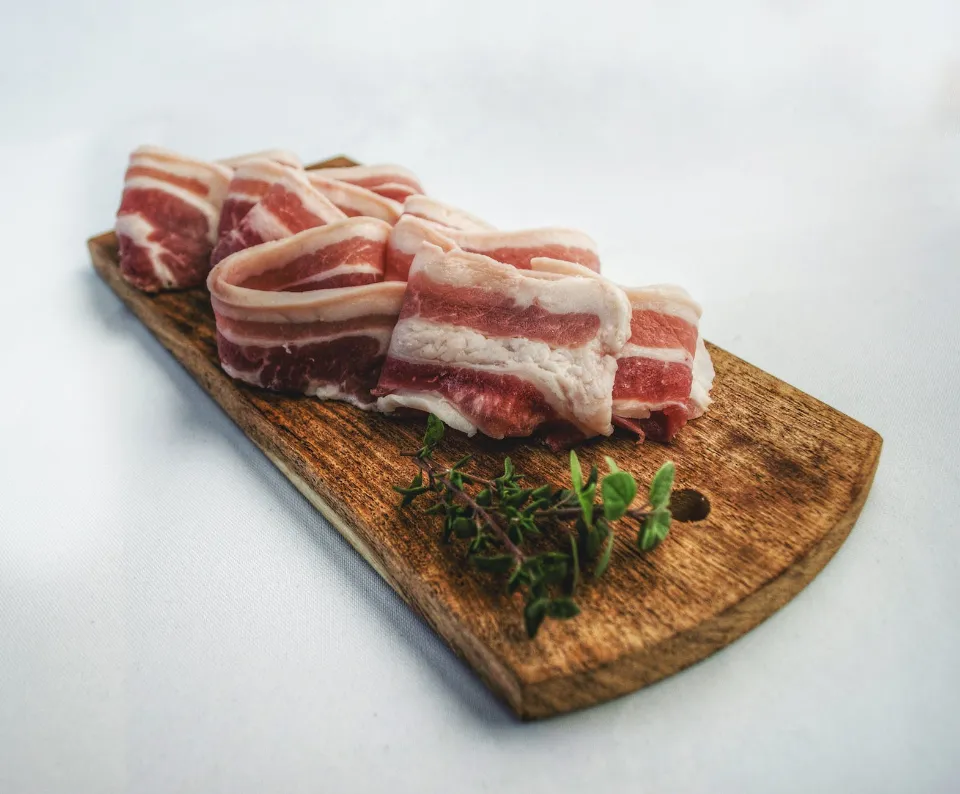
How Bacon’s High Salt Content Affects Your Dog
Dogs could be poisoned by the excessive salt in bacon. Dogs who consume excessive amounts of salty food run the risk of developing salt poisoning, also known as sodium ion poisoning.
The Pet Poison Helpline lists the following signs of salt poisoning:
- Vomiting
- Diarrhea
- Decreased appetite
- Lethargy
- Incoordination
- Tremors
- Coma
- Seizures
- Excessive thirst or urination
Bacon isn’t the only salt-heavy food consumed by people, though., pretzels, chips, seasoned nuts, lunch meat) should not be shared with your dog. Foods high in sodium can result in bloat, an even more serious and potentially fatal condition.
Dogs may become dehydrated because of the high salt content of foods like bacon and ham, which causes them to drink an excessive amount of water in an effort to quench their extreme thirst. They have too much fluid and gas in their stomachs, which puts pressure on their organs and causes the stomach to twist. Bloat can be fatal, necessitating an urgent visit to the veterinarian for surgery.
Bloat can manifest physically and behaviorally as restlessness, a swollen stomach, pale gums, anxiety, drooling, excessive pacing, and dry vomiting.
Try feeding your dog’s meals in a slow feeder or puzzle toy if your dog is a living vacuum who gobbles down his meals while swallowing a lot of air in the process to prevent bloat. If your dog gulps water, measure out smaller portions.
The 24-hour Animal Poison Control Center can be reached at 855-764-7661 if your dog displays any of the aforementioned signs of salt poisoning. Do not hesitate to bring your dog to the emergency clinic if bloat is a concern.
READ MORE:
Summary: Can Dogs Eat Bacon?
Although they can eat bacon, dogs shouldn’t if at all possible because it’s not very healthy. However, since most dogs adore the smell and flavor of bacon, it can serve as a special treat or a very high-value reward. However, it must remain that way and only be a treat. Bacon can cause your dog to gain weight and, if consumed in large quantities, can make them sick. Your dog shouldn’t eat a lot of bacon or consume it frequently.
Therefore, if you’ve had a cooked breakfast and your dog has been a good boy (or girl), you could cut off a small piece of bacon and give it to them; it usually won’t harm them. Just don’t start serving Fido his own fry-up every week, and don’t offer him a whole rasher.
Bacon is delicious but not very healthy. Your dog should be eating something that’s both delicious and nutritious, like Pure! Pure is ideal for giving your dog a healthy, balanced diet because it contains meat, fruit, and vegetables.

